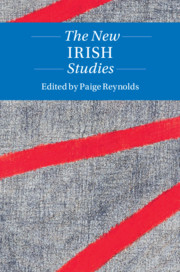Book contents
- The New Irish Studies
- Twenty-First-Century Critical Revisions
- The New Irish Studies
- Copyright page
- Contents
- Notes on Contributors
- Acknowledgments
- Introduction
- Part One Legacies
- Part Two Contemporary Conditions
- Chapter 6 The Global Contemporary: The Humanitarian Legacy in Irish Fiction
- Chapter 7 The Queer Contemporary: Time and Temporality in Queer Writing
- Chapter 8 The Feminist Contemporary: The Contradictions of Critique
- Chapter 9 The Maternal Contemporary: Pregnancy, Maternity, and Non-Maternity on the Irish Stage
- Chapter 10 The Aging Contemporary: Aging Families and Generational Connections in Irish Writing
- Part Three Forms and Practices
- Index
Chapter 7 - The Queer Contemporary: Time and Temporality in Queer Writing
from Part Two - Contemporary Conditions
Published online by Cambridge University Press: 18 September 2020
- The New Irish Studies
- Twenty-First-Century Critical Revisions
- The New Irish Studies
- Copyright page
- Contents
- Notes on Contributors
- Acknowledgments
- Introduction
- Part One Legacies
- Part Two Contemporary Conditions
- Chapter 6 The Global Contemporary: The Humanitarian Legacy in Irish Fiction
- Chapter 7 The Queer Contemporary: Time and Temporality in Queer Writing
- Chapter 8 The Feminist Contemporary: The Contradictions of Critique
- Chapter 9 The Maternal Contemporary: Pregnancy, Maternity, and Non-Maternity on the Irish Stage
- Chapter 10 The Aging Contemporary: Aging Families and Generational Connections in Irish Writing
- Part Three Forms and Practices
- Index
Summary
As the Irish LGBTQ+ community has emerged in a period of radical and rapid social change, the figure of the queer is often made to function as a figure for social progress. By focusing on recent queer critical work on time and temporalities, this chapter asks how the queer figure of the contemporary fails to address lingering traumas of social stigma and violence (including the 1982 antigay murder of Declan Flynn) and also fails to fully account for the connection of temporalities to sexual identity and belonging. By examining representations of sexual bodies in and out of sync with normative social and temporal structures – particularly in literature by Irish lesbian writers, such as Emma Donoghue and Mary Dorcey – this chapter foregrounds the ways that temporalities script and structure the sexual and how some forms of queer identity and community may resist or rethink those scripts through alternative registers of time.
- Type
- Chapter
- Information
- The New Irish Studies , pp. 129 - 143Publisher: Cambridge University PressPrint publication year: 2020
- 2
- Cited by

